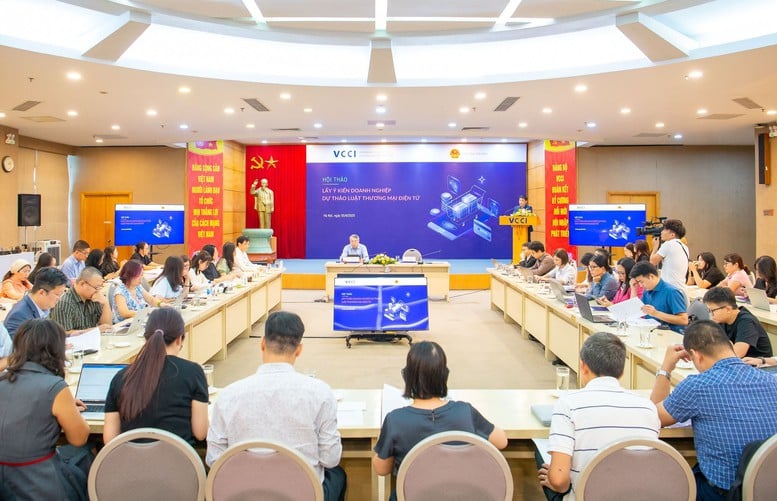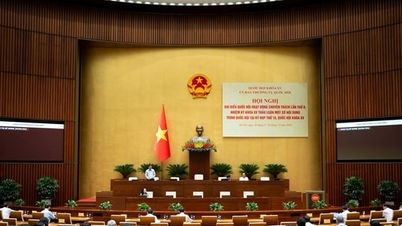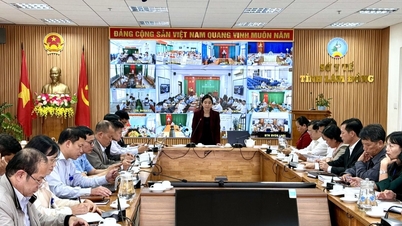
Workshop to collect business opinions on the Draft Law on E-commerce - Photo: VGP/HT
The draft law focuses on four main focuses
On the afternoon of September 5, the Ministry of Industry and Trade coordinated with the Vietnam Federation of Commerce and Industry (VCCI) to organize a workshop to collect business opinions on the Draft Law on E-commerce. This document not only meets state management requirements but also creates a transparent legal corridor for sustainable development of digital commerce and protects consumer rights.
The Ministry of Industry and Trade is presiding over the drafting of the Law on E-commerce, which is expected to be submitted to the National Assembly at its session next October. This is an important document that will directly impact businesses, business households and individuals involved in online sales and service provision.

Mr. Hoang Ninh, Deputy Director of the Department of E-commerce and Digital Economy (Ministry of Industry and Trade) - Photo: VGP/HT
In his opening speech, Mr. Hoang Ninh, Deputy Director of the Department of E-commerce and Digital Economy (Ministry of Industry and Trade), emphasized that e-commerce has become a driving force for economic growth in recent years. "The development of the E-commerce Law is an urgent task, both serving management and paving the way for sustainable e-commerce development," he said.
According to Mr. Ninh, the draft law has four main focuses: Protecting the rights of online consumers; strengthening tax management, limiting revenue loss; preventing counterfeit and fake goods; creating a legal mechanism for e-commerce to maintain 18-20% growth per year, becoming the driving force of the digital economy.
The Ministry of Industry and Trade has organized many consultation sessions with businesses, associations, and experts to listen to their opinions. "We hope to receive substantive comments from the community to complete the draft before submitting it to the National Assembly," Mr. Ninh affirmed.
E-commerce is growing rapidly, need to complete legal framework promptly
Mr. Dau Anh Tuan, Deputy Secretary General and Head of the Legal Department of VCCI, said that Vietnam's e-commerce has reached a scale of over 25 billion USD by the end of 2024, growing 18-25% per year. Vietnam is currently among the fastest growing countries in the region.
"Activities such as online shopping, digital payments, logistics, and digital services are increasingly ingrained in life, fundamentally changing business and consumption habits," said Mr. Dau Anh Tuan.
However, the VCCI representative said that this boom also brings with it many challenges: protecting consumer rights, managing livestream sales, controlling counterfeit and fake goods. These are issues that are regularly raised in the National Assembly, in the media and on forums.

Mr. Dau Anh Tuan, Deputy Secretary General and Head of the Legal Department of VCCI shares information - Photo: VGP/HT
According to Mr. Tuan, the e-commerce ecosystem is currently very diverse, from large technology platforms, reputable brands to hundreds of thousands of small businesses, along with logistics, payment, livestream service and affiliate marketing enterprises. Therefore, the legal framework needs to ensure a balance of interests: strict management, consumer protection, and encouragement of innovation.
"VCCI participated from the very beginning, contributing many ideas, especially related to procedural reform and protecting sellers on e-commerce platforms," Mr. Tuan shared.
From a business perspective, in the comments sent to the Workshop, Viettel Post representatives paid special attention to Article 16.6.d of the draft: large digital platforms "must not force sellers and buyers to use payment or logistics services of a supplier without a legitimate reason".
Businesses believe that this regulation is not strong enough, because some platforms may limit the choice to only 1-2 providers, affecting users' rights. Viettel Post proposed to amend it to: "Do not hinder or restrict users from exercising their right to choose organizations providing payment and logistics services to support e-commerce".
According to the argument of the business, the nature of the intermediary platform is only a connecting environment, and should not interfere with the agreement between the buyer and the seller. In the world, many countries have strict regulations to prevent the behavior of limiting the right to choose of the platforms that dominate the market.
For example, China's E-Commerce Law (Article 20) or the European Union's Digital Markets Act (Article 6.6) prohibit this practice. Large platforms such as Alibaba and Amazon also allow sellers to choose their own shipping units or negotiate directly with customers.
"The amendment to the regulations will help to protect the rights of sellers and buyers to the maximum extent, prevent abuse of dominant position and create a fairer business environment," emphasized a representative of Viettel Post.
According to experts, the Law on E-commerce is expected to nurture an e-commerce ecosystem with a long-term vision, both protecting consumers and synchronously developing pillars such as digital infrastructure, logistics, and payment. The law must also support small and medium-sized enterprises to improve their competitiveness and expand domestic and foreign markets.
At the same time, e-commerce needs to be placed within the overall digital economic development strategy, linked to the goal of national digital transformation and sustainable growth. In addition, policies should encourage transparency of digital platforms, including social networks, creating maximum conditions for buyers and sellers, especially SMEs, to take advantage of the digital environment with low costs and opportunities to access open markets.
Mr. Minh
Source: https://baochinhphu.vn/luat-thuong-mai-dien-tu-can-bao-ve-nguoi-tieu-dung-thuc-day-thi-truong-so-ben-vung-102250905204814503.htm







































































































Comment (0)